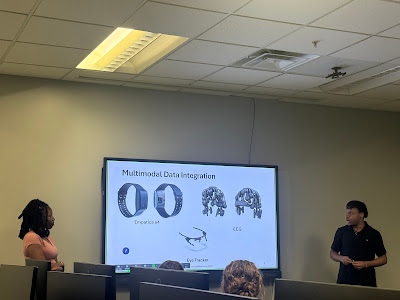2024-07-22: Disinformation Detection and Analytics REU Program – Mid-Summer Presentations
 |
| 2024 REU cohort and faculty after the mid-summer presentation session, 2024-06-21 |
The Department of Computer Science Research Experience for Undergraduates (REU) program provides hands-on learning and research experience to students interested in developing novel tools and techniques for identifying and countering online disinformation. During their 10-week summer research program, they work with faculty and students from WS-DL, NirdsLab, AccessLab, LampSys, and VMASC. This year the program started on 2024-05-23, with the participation of eight students. The program is funded by the National Science Foundation (NSF) Research Experiences for Undergraduate Sites. A detailed introduction to the 2024 program can be found in the blog post by Lawrence Obiuwevwi.
The mid-summer presentations of the REU program were held on Friday, June 21st, at the Department of Computer Science. The presentations provided a high-level overview of their research problem, progress, and preliminary results. Each student had 10 minutes to present their progress, followed by a question-and-answer session, during which faculty members provided valuable feedback for improving their research project.
Caoilainn from Pomona College gave the first presentation, “Neurodivergence in the US Criminal Justice System”. In the project, Caolainn analyzes the existing literature to find the different topics related to neurodivergent individuals in the American criminal justice system. Dr. Perroti mentors the project and they use natural language processing to collect data and aim to discuss the different topics in the literature.
Summer REU 2024 Mid-Summer presentation session just started.@caoilainnsc started the session and now presenting her project titled “Neurodivergence in US Criminal Justice System”. pic.twitter.com/H4XEDZ0uXq
— Kumushini Thennakoon (@KumushiniT) June 21, 2024
Next, Ashlyn from Harding University presented her study titled “Categorizing Twitter Screenshots”. Dr. Nelson mentors the project and they attempt to identify fake Tweet screenshots generated by online tools or utilizing developer tools. She plans to extend the study to identify the differences in screenshots on different social media platforms.
.@AFarris04 of @oducsreu summer 2024 is now delivering her presentation on “Categorizing Twitter Screenshots”@WebSciDL @oducs pic.twitter.com/gsnf6ZxIYI
— Kumushini Thennakoon (@KumushiniT) June 21, 2024
Following that, Emily from William & Mary presented “Early Misinformation Detection in Russian-Ukraine News Articles,” mentored by Dr. Poursardar. Their investigation uses a combination of language translation and natural language processing techniques to identify different types of misinformation and disinformation found in news articles.
Third presenter of the Summer REU 2024 Mid-summer presentation session @em_ebalo is now sharing her work so far on “Early Misinformation Detection in Russian-Ukraine News Articles”.@WebSciDL @oducsreu @oducs pic.twitter.com/yr1iQvZGcC
— Kumushini Thennakoon (@KumushiniT) June 21, 2024
Next, Stefania from Lehigh University presented “Dark Pattern Detection,” mentored by Dr. Ashok. Identifying dark patterns helps prevent unintended actions and misleading content on web pages. Their study developed an annotated dataset containing dark patterns, which will later be used for dark pattern detection combined with large language models.
.@sdzhaman of @oducsreu summer 2024 is now presenting her work on “Dark Pattern Detection” at the Mid-summer presentation.@WebSciDL @oducs @ODUSCI pic.twitter.com/dw9070d6a3
— Kumushini Thennakoon (@KumushiniT) June 21, 2024
Following the coffee break, Kevin from St. John’s University presented “Misinformation in Virtual Reality”. The project investigates user behavior in virtual reality while interacting with misinformation using eye tracking. Dr. Jayarathna mentors the project and will use deep fake images and videos to form misinformation.
.@CauchiKevin of @oducsreu 2024 is now delivering his presentation on “Misinformation in Virtual Reality” at the Mid-summer presentations.@WebSciDL @oducs @ODUSCI pic.twitter.com/tCrDxHxoGt
— Kumushini Thennakoon (@KumushiniT) June 21, 2024
Next, Jessica from Tidewater Community College presented “Misinformation in the Venezuela-Guyana Border Dispute and its Impact on Sentiments on Venezuelan Migrants in Guyana,” mentored by Dr. Frydenlund. In the study, they investigate the prevailing sentiment towards the migrants expressed through YouTube comments.
.@jessicasmelton from @oducsreu summer 2024 is now sharing her progress of her research project titled “Misinformation in the Venezuela-Guyana Border Dispute and its Impact on Sentiments on Venezuelan Migrants in Guyana”.@WebSciDL @oducs @ODUSCI pic.twitter.com/KmoIP9nLZs
— Kumushini Thennakoon (@KumushiniT) June 21, 2024
In the next presentation, Leah from the University of Maryland Baltimore County presented “Examining Methods of Engagement on Instagram,” where they analyzed disinformation on Instagram. The project is an extension of previous REU projects and is mentored by Dr. Weigle. In their study, they examined the social media behavior of anti-vaxxers during the pandemic by processing the scraped mementos from Archive.today and Internet Archive’s Wayback Machine.
.@leah_princ635 from @oducsreu is now presenting her work on “Examining Methods of Engagement on Instagram” at the Mid-Summer presentations.@WebSciDL @ODUSCI @oducs pic.twitter.com/zCoBuZ5gK6
— Kumushini Thennakoon (@KumushiniT) June 21, 2024
Then, Matthew from Old Dominion University presented “Scientific News Verification with Chain-of-Thought,” mentored by Dr. Wu. Their approach combines a Chain-of-Thought approach with large language models to effectively verify scientific news, thereby adding a reasoning process to achieving the final answer.
.@Matt_Maisonave from @oducsreu is now presenting his work on “Scientific News Verification with Chain-of-Thought” at the Mid-Summer presentations.@WebSciDL @oducs @ODUSCI pic.twitter.com/4J3sePhFYu
— Kumushini Thennakoon (@KumushiniT) June 21, 2024
The final presentation was by Kavari and Brionna from Bowie State University and they presented “Understanding Human Emotions Associated with Attention Activities in Temporal Domain Utilizing Multimodal Data” jointly mentored by Dr. Jayarathna and Dr. Soo-Yeon Ji from Bowie State University. Their study uses eye tracking, EEG, and biosensors for emotion detection.
 |
| Kavari and Brionna presenting at the mid-summer presentations session. |
 |
| Kavari and Brionna presenting at the mid-summer presentations session. |
The presentation session provided students with valuable feedback on their research projects and suggestions for improving their presentations. The students will continue their projects until the end of their program on July 23rd.
Comments
Post a Comment